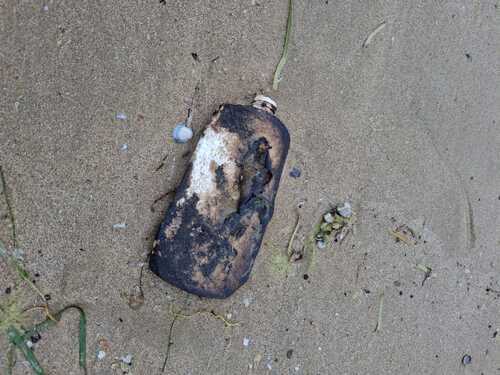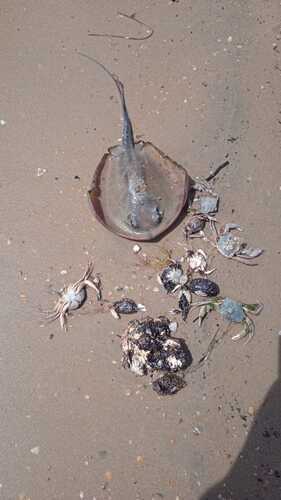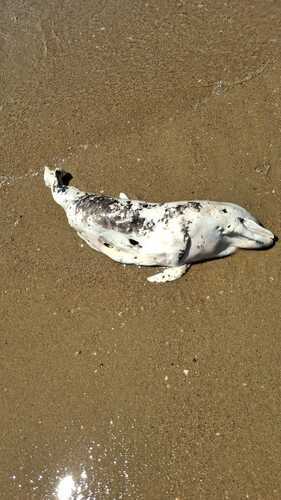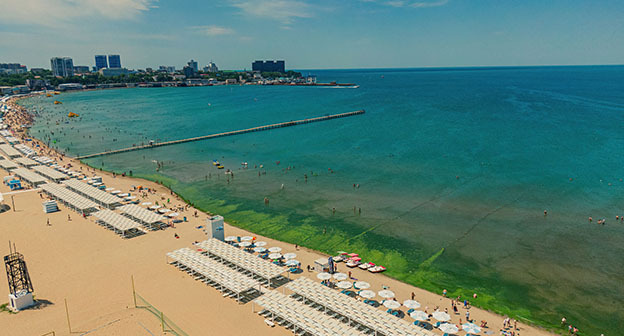Tourist season in Anapa sparks disputes among local residents
Despite the warnings made by the “Rospotrebnadzor” (Russian Federal Service for Supervision of Consumer Rights Protection and Human Wellbeing) and official bans on bathing, tourists continue filling the beaches of the city of Anapa. Disputes continue in the information field: some local bloggers assure that the sea is clean and everything is safe, while environmentalists and guest house owners, on the contrary, are voicing out alarms and talking about manipulations.
Differences in opinions
 Elena Leitan, the leader of the “Green Patrol” Culture-Ecological Club, told the "Caucasian Knot" that the volunteer work continues. "The beaches of Vityazevo have become very clean and comfortable; we can clean them with the help of equipment, the so-called chambers. The temperature has risen up to 26 degrees, and this has created new problems. Fuel oil (mazut) has become appearing again," she has noted.
Elena Leitan, the leader of the “Green Patrol” Culture-Ecological Club, told the "Caucasian Knot" that the volunteer work continues. "The beaches of Vityazevo have become very clean and comfortable; we can clean them with the help of equipment, the so-called chambers. The temperature has risen up to 26 degrees, and this has created new problems. Fuel oil (mazut) has become appearing again," she has noted.
The temperature has risen up to 26 degrees, and this has created new problems. Fuel oil (mazut) has become appearing again
Elena has added that the resort season has been launched for large hotels with swimming pools and which operate under the "all inclusive" principle. "There are people there, and guests of these hotels are visiting Anapa beaches, despite the banners posted about the ban on staying on the beach and bathing. Some are not embarrassed by these bans; and no one fines them for this," she says.
 Blogger Yuri Ozarovsky posted a video in his Telegram channel with the caption: "To relax at any cost: the beaches of Anapa, which were recently flooded with fuel oil, are now full of vacationers – no one is stopped by swimming bans and warnings about the danger." The blogger "is happy about this."
Blogger Yuri Ozarovsky posted a video in his Telegram channel with the caption: "To relax at any cost: the beaches of Anapa, which were recently flooded with fuel oil, are now full of vacationers – no one is stopped by swimming bans and warnings about the danger." The blogger "is happy about this."
The beaches of Anapa, which were recently flooded with fuel oil, are now full of vacationers
In his conversation with the "Caucasian Knot" correspondent, Ozarovsky has confirmed: "No one is stopping vacationers on the beaches or fining them for their bathing in officially prohibited places. Beaches attract different tourists – both those who came on vouchers and those who came by their own."
Max Anapsky, a blogger, has presented independent laboratory tests of water, financed by his subscribers. "The test results for the presence of petroleum products in the sea water show that all of them are below the permissible level of 0.05 mg/dm3." The blogger also said that the “Rospotrebnadzor” didn’t respond to his request about what standards they had applies and what results they had obtained.
All the tests are just mosaic pieces
 Igor Shkaradyuk, an environmentalist, believes that the tests conducted by bloggers fail to give a complete picture. "Right now, the sandy Anapa beaches have small drops of fuel oil thrown out of the sea. But they are not everywhere. "You can walk a hundred meters and collect a bucket of fuel oil, or you can walk and not see a single drop," he told the "Caucasian Knot" correspondent.
Igor Shkaradyuk, an environmentalist, believes that the tests conducted by bloggers fail to give a complete picture. "Right now, the sandy Anapa beaches have small drops of fuel oil thrown out of the sea. But they are not everywhere. "You can walk a hundred meters and collect a bucket of fuel oil, or you can walk and not see a single drop," he told the "Caucasian Knot" correspondent.
No one has a real picture of what is happening with fuel oil in the Black Sea
"You can find a clean shore section; you can find another one covered in fuel oil; and tomorrow these will be different sections. You can watch the coast for several days and not see a drop of fuel oil in this place; or you can collect 35 kilograms of fuel oil in one hour, like Evgeny Ischekhovtsov, a volunteer with the Ministry for Emergencies (MfE), did last week. In a strong storm, waves can rock tankers’ wreckages lying on the bottom, and much more fuel oil will spill out of them. And in calm weather, clean seaweed can wash up on the shore, or dead crabs with fuel oil stains and dead fish covered in fuel can wash up. "It happens," Mr Shkaradyuk has noted.
According to his version, unfortunately, the “Rospotrebnadzor” wouldn’t release results of official analyses. "Nobody has a real picture of what is happening with fuel oil in the Black Sea. And any video evidence, protocols, independent analyses, etc., show only a small piece of the whole mosaic. It’s impossible to say for sure that the situation has improved," he has emphasized.
Igor has shown a photo made on May 21, which shows a dead baby dolphin in fuel oil; on May 23, a photo was made of divers with bags of fuel oil; on May 25, oil-covered crabs and rays were filmed; and in the photos made on May 26-28, algae with fuel oil and garbage are visible.
Small businesses are on the brink
Evgeniya, an owner of the guest house, told the "Caucasian Knot" that guest houses are empty this season.
"Tourists go on vouchers to large hotels. They are all there. What has attracted them? Perhaps, low prices and ads posted by bloggers like Ozarovsky and Max Anapsky. People see no official information, and it’s practically absent. People look at the Internet and bloggers; they see discounts and ads ... It seems that wine tours are now being practiced, which are also actively advertised. The streets are full of drunken tourists. Of course, they don't care about fuel oil ...," Evgeniya has concluded.
They come to relax; and they simply don’t want to think about the negative consequences
 Her colleague Tatiana from the dwelling settlement of Sukko believes that "people don’t see fuel oil because they do not want to see it".
Her colleague Tatiana from the dwelling settlement of Sukko believes that "people don’t see fuel oil because they do not want to see it".
"They come to relax; and they simply don’t want to think about the negative consequences. For several days now I meet vacationers who are fine. Their feet are covered in fuel oil from walking on oil-contaminated sand, because it melts and sticks to their feet. But they don't see any of this, especially when they're drunk," she told the "Caucasian Knot" correspondent.
Tatiana said that children's camps continue working, but there are no children to be seen on beaches. In Sukko, they began installing a permanent fence that goes into the sea and separates the city beach from the camp territory.
"On May 27, President Putin signed the law "On conducting an experiment in providing guest house services." This is a blow to the population layers that survived thanks to the budget resort business. They will simply destroy us and strangle with taxes and requirements. In this way, authorities are solving the problem of closing small hotel businesses in favour of expensive chain hotels," Tatiana has also emphasized.
The “Rospotrebnadzor” asserts that the beaches in Crimea are clean, although we know about the pollution there too.
Tatiana is sure that the problem is not so much in the fuel oil, but in the authorities' desire to redirect tourism to Crimea. "The ‘Rospotrebnadzor’ says that beaches in Crimea are clean, although we know about the pollution there too. This is being done to replenish the Crimean budget," she has suggested.
According to the “Rospotrebnadzor” data from May 23, on the coast of the Krasnodar Territory from Novorossiysk to Sochi, "there are no deviations or violations for all the indicators studied." "In the territory of the Republic of Crimea and the city of Sevastopol, all indicators also comply with the standards. The territories of Anapa and the Temryuk District remain in the high-risk zone and cannot be used for now," says the website of the Federal Service.
According to Tatiana, a local resident, an "alarming picture is currently emerging" in Anapa. Official agencies are announcing bans; local activists and environmentalists confirm the pollution, while bloggers assure that vacations are safe. Tourists, not wanting to know the truth, continue sunbathing and swimming; and small businesses are trying to survive. The truth is drowning in fuel oil foam and information noise," she told the "Caucasian Knot".
This was originally published on the Russian page of 24/7 Internet agency ‘Caucasian Knot’ on May 29, 2025 at 10:14 pm MSK. To access the full text of the article, click here.
Source: CK correspondent

